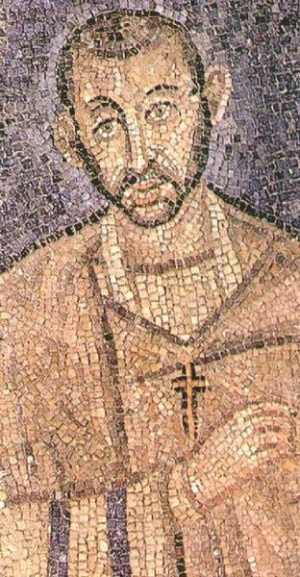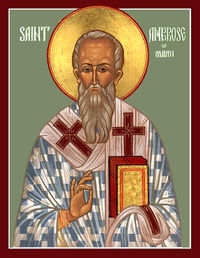Ambrose of Milan
Life
Ambrose was born a citizen of Rome in Trier, Germany, between 337 and 340. His family were Christians. His father was prefect of Gallia Narbonensis, his mother a woman of intellect. He was educated in Rome for a career following that of his father. As his education in literature, law, and rhetoric progressed he was placed by praetor Anicius Probus on the council of Ligura and Emilia and then made consular prefect with headquarters in Milan. In this position he established himself as an excellent administrator.
In the contention between the Nicene and Arian parties for the succession to the vacant see of Milan after the death of the Arian Auxentius in 374, an address that Ambrose delivered in the midst of the crisis led to his acclamation as the only competent candidate for the position of bishop of Milan. While he was only a catechumen, he was quickly baptized and then within days installed as the new bishop of Milan. He quickly began studying theology under Simplician, a presbyter of Rome. After settling his personal life, dividing his money among the poor and arranging for the care of his family, and he, then, devoted himself to the work of the church.
Soon, the new bishop of Milan began to follow the cause of the Nicenes within the church in arguments with the Arians. In the imperial court Ambrose enjoyed the support of Gratian who was the son of Valentinian I, but Ambrose's arguments could not bring the younger son Valentinian from the Arian side. As the religious arguments progressed, the leaders of the Arians, Palladius and Secundianus, proposed to Gratian to call a general council. Sensing that this was a reasonable request, Gratian agreed, but Ambrose foreseeing adverse consequences, convinced the Emperor to limit the council to a meeting only of the Western bishops.
This synod was convened at Aquileia in 381 with 32 bishops present. With Ambrose presiding, the council called upon Palladius to defend his opinions. Citing that the meeting was not representative of the church and was biased, Palladius refused. The synod then voted to depose both Palladius and Secundianus from their episcopal offices. But, the fight against the Arians intensified when, in 384, Valentinian, his mother Justina, and many among the clergy and the laity who professed the Arian faith requested of Ambrose, as bishop, the use of two churches in Milan and its suburbs. Ambrose refused and when called before the council to answer for his behavior, he was accompanied by a crowd of people whose zeal so overawed Valentinian's ministers that Ambrose was allowed to leave the meeting without having to surrender the churches. The prefect of the city followed up with further persuasive requests for use of a church in the suburbs. Since Ambrose was still being obstinate, the officers of the household began to take action to prepare the churches for the emperor, but backed off upon seeing the strength of Ambrose's firm stand, particularly when he stated, "If you demand my person, I am ready to submit: carry me to prison or to death. I will not resist, but I will never betray the church of Christ. I will not call upon the people to succour me. I will die at the foot of the altar rather than desert it. The tumult of people I will not encourage, but God alone can appease it." However, circumstances never actually tried Ambrose's courage to this degree.
When members of the "old state religion" tried to obtain approval from Emperor Valentinian II to restore the Altar of Victory to its old station in the Roman Senate, to properly support seven Vestal Virgins, and to make regular observances of other pagan rites, Ambrose vigorously presented counter-arguments to the absurdity and hypocrisy of their requests, noting that it was the duty of a Christian prince to suppress pagan rites.
Equally, Ambrose held firm with the Emperor against any show of favoritism for the Jews, pointing out to the Emperor, when he was favoring rebuilding a synagogue that a mob had destroyed, the many houses of wealthy people and churches that had been destroyed by unruly mobs, with many then still not restored. Yet, Ambrose did not oppose punishing those who were directly responsible for destroying the synagogue.
While much of his support from the people came from his popularity and reverence paid to him, he also built upon these associations with the poor and with introduction of popular reforms in the order and manner of public worship. He also preached on the public characters of his time, in which the applause of the people was often mingled with derision of the imperial court. While the court was often displeased with his religious positions and his conduct, they respected his political talents and when the need arose, they solicited his aid which he generously granted. Thus, when Magnus Maximus usurped power in Gaul and was considering entering Italy, Valentinian asked Ambrose to go to Gaul and dissuade him from doing so. Ambrose's journey was successful. In a second try for mediation, Ambrose was not as successful as his advice was not followed, allowing Maximus to enter Italy and take Milan. While Justina and her son fled, Ambrose remained in Milan and attended to many of those who suffered from the invasion.
In the power struggles of the late fourth century, Theodosius I, emperor of the East, came to be in undisputed possession of the Roman empire. Yet, Ambrose chastised Theodosius for a massacre in Thessalonica, bidding him to emulate David in repentance. Also, he encouraged Theodosius in the enactment of the "Theodosian decrees", which were more characteristic of Ambrose's agenda than that of Theodosius. After the defeat of Eugenius he asked for pardon of those who supported Eugenius. Ambrose reposed on April 4, 397, two years after the death of Theodosius. Ambrose's successor as bishop of Milan was Simplician.
Ambrose is ranked with the great Western Christian leaders of the time: St. Augustine of Hippo, St. Jerome, St. Gregory the Great, and St. Hilary of Poitiers. Ambrose was most known for his administrative talents, given his education and early experience before becoming a bishop. Yet, like Hilary he was an Alexandrian and was in the forefront in the doctrinal issues of the day, particularly those concerning Arianism. His sermons were famous and were influential in the conversion of Augustine, whom he eventually baptized. His endeavors in hymn writing became models of hymns of dignified simplicity for future times. Ambrose is credited with introducing antiphonal chanting wherein one choir alternates with another.
External links
- St. Ambrose the Bishop of Milan (OCA)
- Ambrose, Bishop of Milan (GOARCH)
- Nicene and Post-Nicene Fathers, Series II, Vol. X: St. Ambrose from the Christian Classics Ethereal Library
- Wikipedia:Ambrose
Categories > Church History
Categories > Church History
Categories > Church History
Categories > Church History
Categories > Liturgics > Feasts
Categories > Liturgics > Feasts
Categories > Liturgics > Feasts
Categories > People > Clergy > Bishops
Categories > People > Clergy > Bishops > Bishops by century > 4th-century bishops
Categories > People > Saints
Categories > People > Saints > Church Fathers
Categories > People > Saints > Saints by century > 4th-century saints

